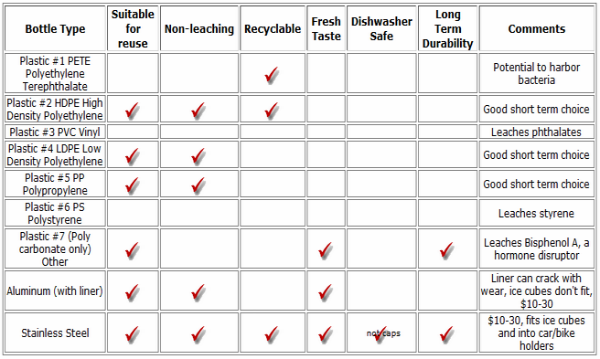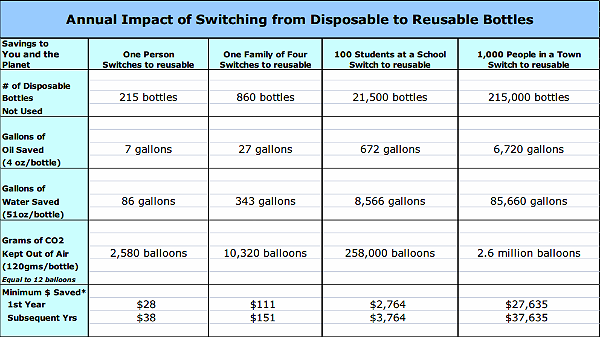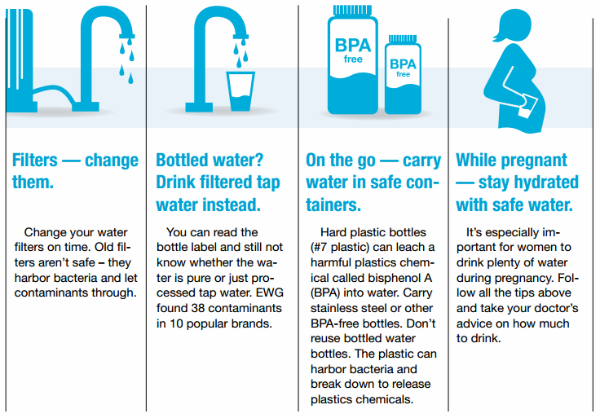US starts to ban bottled water

A law passed by the town of Concord, in the US state of Massachusetts, went into effect with the New Year, making single-serving bottles of water illegal. However, Coke or other soft drinks are exempt, it only applies to non-sparkling, unflavored drinking water. The ban is intended to encourage use of tap water and curb the worldwide problem of plastic pollution. Sanctions for now include first time warning and a second offend will be fined $25, and $50 thereafter.
Developed nations such as the US spend billions of dollars buying bottled water and the plastic bottles that this water comes in create billions of pounds of oil based trash destined to live out a thousand year lifespan in a trash dump. In one year, 318 billion bottles of water are consumed. Major cities in America have made recycling available but only 1 in 5 water bottles ever gets recycled – 4 go to the trash dump to create about 3 billion pounds of waste just from all of the discarded plastic. This leads to an unseen global waste catastrophe. Many researchers and environmental organizations now list plastic as the number one threat to our marine environments around the planet. Plastic bags and other plastic garbage thrown into the ocean kill as many as 1,000,000 sea creatures every year!
Reusable bottle comparison table (Credit: Back2Tap)
Disposable plastic water bottles are made out of oil which is a finite natural resource. Plastic bottles require energy to make and transport. It takes 17 million barrels of oil to produce bottled water – enough oil to fuel 1 million cars for a whole year. Luckily tap water is very cheap because it takes about 3 times the amount of tap water to produce and fill 1 bottle of bottled water.
One bottle of water takes over 700 years to decompose. The production of plastic water bottles in the U.S. alone creates 2.5 million tons of carbon dioxide, a key greenhouse gas.
According to statistics, Americans are drinking 8.6 billion gallons of water annually. Although, on average, bottled water cost $10 per gallon compared to tap water which costs $.0015 per gallon, Americans are willing to pay 10,000 times the cost of tap water. Many regions of the world lack access to clean drinking water, and bottled water is the only safe alternative. Companies know this and have been cleaning up in countries like China, Pakistan and India in recent years. Global consumption of bottled water goes up 10 percent each year. Countries with their own clean drinking sources sell even more clean water to people who already have it, at a further increased cost.
Infographic presented by OnlineEducation
Bottled water companies often buy the rights to ponds, lakes, rivers, and springs, damming and diverting the flow of water to suit their needs. For many bottled water companies, choosing a location with access to large markets for their company is more important than the quality of water.
* (Estimate based on 2008 U.S. results; 28 1/2 gallons per person (equivalent to 215 17oz disposable plastic bottles) at average price of 17 ¢ per bottle ($1.32 per gallon); tap water cost approximately $.002 per gallon; overall recycling rate of 22%; average retail price of Back2Tap bottle of $10.00)
(Source: Beverage Marketing Corporation)
Bottled water vs. tap water
Globally some 53 billion gallons of bottled water are consumed creating a $63 billion dollar industry. 40% of this bottled water is actually taken from municipal water sources or tap water. U.S. FDA regulations allow for some contamination of fecal material and E. coli in bottled water. Additionally, there are no requirements for bottled water to be tested for parasites or disinfectants. Bottled water companies are also not required to notify their customers if elevated levels of contaminants are found. Bottled water can be distributed even if it doesn’t meet the quality standards of tap water. Unlike tap water, bottled water isn’t required to produce quality reports or even provide it’s source. Bottling companies buy the water and filter it, and some add minerals.
Vitamins, color, herbs, protein, and all the other additions to water — those are a marketing ploy. Plus, the additives are usually a scant serving of the vitamins you really need in a day. Enhanced waters usually contain sugars and artificial flavorings to sweeten the deal and can pack more calories than diet soda. When it comes to providing fluoride, tap water usually wins, though that element is increasingly being added to bottled waters.
Many municipal water systems are aging and there remain hundreds of chemical contaminants for which no standards have been established, but there's very little empirical evidence that suggests bottled water is any cleaner or better for you than its tap equivalent.
Many plastic water bottles contain chemicals called phthalates, which can leach into bottled water. Phthalates are known to disrupt testosterone and other hormones, which can lead to abnormal sexual development, male infertility, premature breast development, cancer, and miscarriages. The bottled water companies successfully opposed the FDA’s proposal to regulate phthalates in the bottled water industry.
Tips for safe drinking water (Credit: Environmental Working Group)

Just for your information, the first documented case of selling bottled water was in Boston in the 1760s when Jackson's Spa took mineral water and sold it for therapeutic uses. Other later examples include the bottling of water in Saratoga Springs and Albany.


Bellow, you can watch popular video about bottled/tap water facts:


Take a look what bottles say about our culture from the perspective of an anthropologist from the distant future:


Increasing urbanization and population, shifting climates and industrial pollution are the main drivers why fresh water is becoming humanity's most precious resource. Blue Gold, Water Wars and other new terms are subjects for another story that we like to share with you. Think about it…
GET THE FACTS:
- Increasingly, bottled water comes from the tap
- Bottled water creates mountains of garbage and causes other major environmental problems
- Bottled water is thousands of times more expensive than tap water
If you purchase bottled water because you dislike the taste of tap, try using a water filter, and an eco-friendly bottle when you’re on the go. And if you have serious concerns about the quality and safety of your local tap water, contact your city officials as soon as possible – don’t try to sidestep the problem with bottled water. We are not talking here about which water is better, we just want to point the problem of plastic bottles and environmental danger.
Environmental Working Group's report "2011 Bottled Water Scorecard"
Tell Congress to increase funding for America’s public water
Sources: OnlineEducation, Back2Tap, AllFilters, National Tap Water Database, BusinessInsider, EWG, CrispyPaul, FoodAndWaterWatch
Featured image credit: The Watchers





very funny, I hope they try to ban. It would be a great class action lawsuit to not allow people to purchase water. Your tap water might be clean when it comes from the water processing plant. However, I t goes through miles of pipes before it arrives at your tap.
It is always interesting to hear people argue about this. There are plenty good reasons to drink Bottled water, especially if it is filtered water. Today filters can filter out minute traces of bacteria and viruses and gives people an extremely clean water source. There is a reason that almost all soft drink manufacturer use reverse-osmosis systems to purify the water even though they could also use Tap Water. The issue is that tap water can easily be contaminated because it is very hard to control the logistics of transporting the water to the consumer. Of course most Municipality water processing Plants are producing clean water, but after it leaves the plant it goes through a huge network of underground pipes that are constructed many years ago. Some pipes are 20 to 40 years old and can be made from anything reaching from concrete, iron, even led. In some cases the water was flowing through 50km or more of pipes until it arrive at the consumer’s house. In the process it collected up hundreds of particles, some are harmless but others are very bad. Of course the consumer could but a water analyzing set to find out what contaminants are in the water and test each morning because every day there is a potential that a pipe busts and something enters the supply. Even if you get a simple particle counter then you will find out that your tap water has between 50 and 200 particles when it arrives on your tap. It is actually interesting because the cleaner the water enters the pipe system the more contaminates it can collect.
It is actually interesting to see what minerals toxins are within allowed limits of most western water supplies. Just have a look at http://water.epa.gov/drink/contaminants/ to see what contaminates are actually allowed, it is alarming on what is allowed to be in the water. Sure most are small amounts but considering that we should drink about 3Liter Water a day then we drink over 1000 liter a year. So according to this list could drink some 10mg of Arsenic, 7 billion Asbestos fibers, 4 Liter of Fluoride or up to 1 Liter of Chloride and it would be OK. It could even be that new substances like hormones and other pharmaceutical substances are not even on the list.
Bottled water is tightly regulated in most countries and it is filled in the sterile environment of factories after it is purified. This means that the water is in its pure state and delivered to the consumer directly. This way no contaminants can be collected and the consumer can drink the water as pure as it was filled into the bottle. Purified Bottled Water is treated in the same manner as a soft drink or juice you buy in the shop. Imagine if your cola or orange juice would flow through 50km of pipes before it enters your glass. Many people seem to say that purified bottled water has no more minerals and vitamins. Well this is correct, all these harmful substances are filtered out and the water is really pure. Especially in our time of age, our diet is quite diverse and we get more than the daily needs of minerals from our food. It is good to drink pure water that can actually flush out the harmful and excess minerals from the kidneys that we get every day from out food and environment.
For me it is all common sense, when did you drink the last time from a well or spring without imagining that there is maybe a pig farm or other polluting factory around the corner. It is unfortunate but our planet is more polluted every day and the rain is transporting these pollutions even into the remotest areas of the world. This is why also most Mineral water is not a sure candidate to get clean water. Most mineral waters cannot be filtered and are bottled the way it came out of the well. Therefore Filtered Bottled Water is the only sure way to get clean controlled water to the consumer.
This is exactly the kind of thing that governments should be doing: regulating behavior for the good of the whole. http://personalmoneynetwork.com/moneyblog/2013/01/03/bottled-water-ban/
I don't think many people will completely stop drinking bottled water, but maybe we could get the preferred bottled water to be one that really helps the world and makes a difference like People Water. People Water sells water so that they can give water away by drilling new wells and repairing old ones. I think people should have a healthy alternative when they're thirsty and near a vending machine or something. I don't think bottled water is what's best for our planet, but if consumers are going to buy something it might as well be this.
http://www.peoplewater.com/
Thanks,
Elijah
same people that eat “white bread” the tapwater must be used or else?
Thanks for the article. Who did you get paid from to write it? Sounds like the government or local water companies. There is spring water which does have to come from a spring source and then there is drinking water which is usually filtered city water and probably still has fluoride in it. And there are spring water companies that reveal the source and some with the exact spring and location and a tested analysis.
Not all spring water is created equally, but not all city water is equal also. There are some places in the us that do not add fluoride to there water and others who add enough to dumb down the smartest iQ to a low functioning status.
You really have done alot of propoganda here for your paycheck and to be honest it really is just alot of copy and paste from several different websites.
Come back with a more informed discussion and you will get better feedback next time.
Till then, go back and do your homework and try again. A rough draft has no business being published here.
Thank you for your time
John
[…] https://watchers.news http://www.blacklistednews.com * AllFilters, National Tap Water Database, BusinessInsider, […]
I now live in the oil field in S.W. North Dakota. The water here is always being tested, but they let it run and run 1st. What would they find if they sampled what comes out right away, I wonder. Until it runs for at least a full minute, it smells like rotten eggs. They even have to post the water quality report all over town several times per year. It only has to pass testing 2 out of three times. Yuck!
Where I grew up in Idaho there was a large number of children who’s teeth were destroyed by fluoride. They had terrible staining and damage. Now three of my classmates have died of cancer and two (besides me) that I know of, have survived at least one type of cancer. Scary stuff!
Big Pharma???
[…] The Watchers […]
It makes sense to stop plastic bottles so we need to go back to glass bottles with a 10 cent recycling charge when you return the bottles you get money back. The government can’t be trusted and who knows what they put in your tap water. Remember the Batman movie destroying Gothem through their water supply? Everyone must drink filtered water and know the best brands out there and stick with them or filter it themselves. Microwaving to clean water will eventually kill you so stick to boiling on the stove if necessary.
Please explain why you think microwaving water is dangerous.
Water the Essence of All LIFE ! S000000 Precious ! $$$$$$$$ and True.
ALL the sugary soda pops are made with tap water. All those things you said about the dangers of plastic bottles, both personal and environmental, are just as true of soda pop bottles. So what aren’t you attacking THOSE? When I go into a supermarket, I see thousands of different items in plastic bottles, of which only a small handful are single-serving waters. Condiments, juices, soda pops, booze – they are all served in plastic bottles.
I suspect there is a hidden agenda here, since the facts are twisted, ignored, and obfuscated in order to get people to stop drinking unflouridated waters that are not contaminated with pharmaceuticals and organic contaminants and leeching lead pipes like tap water is.
Maybe the beer and soda pop people are trying to head off some stiff competition?
It would be great to get rid of all plastic in the world…like it used to be. But the reason bottled water is “picked on” is because you can get it for free (basically) from your home! You can’t get soda from your sink, so it doesn’t get the same kind of treatment. The point is why harm the environment in so many ways for no reason! Just use tap water!! It is ridiculously inexpensive; it is safe! And there are ways to get soda and use less plastic such as getting refills from the gas station.
If they would stop adding fluoride to tap water, then I would not have to buy bottled water. The sugary sodas are far more less healthy and people drink far more of them, so BAN SODAS INSTEAD!!!
I do not drink tap water. We live in agriculture country and the run off water goes into the water table. I refuse to drink it and have not for 13 years or longer. My pets are also given bottled water but have access to both. Fluoride concerns me also. It’s not clear to me why the govt would go to such trouble for teeth and then allow dental care that is preventive be priced out of range for the public.
No to this. I recycle every bottle. Actully i give them to homeless who happen to walk by when I have no more room left. They are recycled because of this. I don’t understand what is going on in this country but it feels sinister….sorry but i connect dots. and you should too.
Giving the bottle to the homeless is calling re-using and not recycling. The homeless might use it a few times and throw it away. Why don’t you boil the tap water and drink it ? It would still be cheaper for you.
So your required to drink more tap water thats infected with FLUORIDE, great plan! Was it the same people who are drinking the fluoride that came up with this plan, it is proven to lower IQ and cause and accelerate cancer.
About time some government starts taking this type of global wasting more serious. Let’s hope others will follow soon.